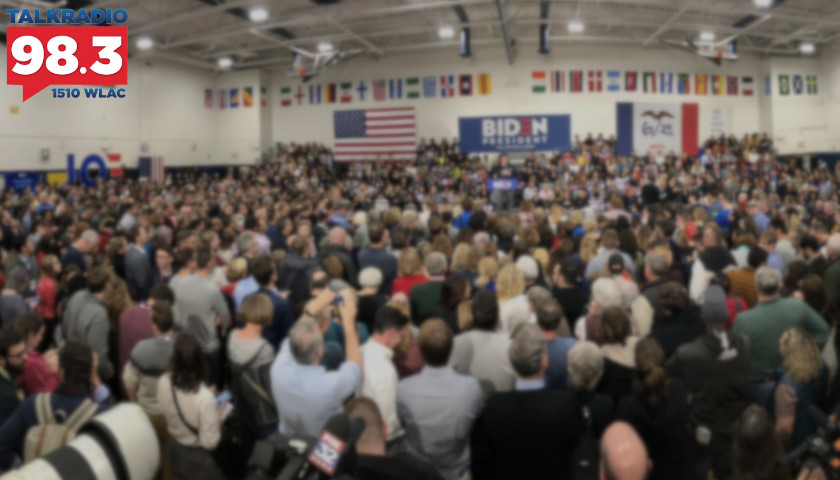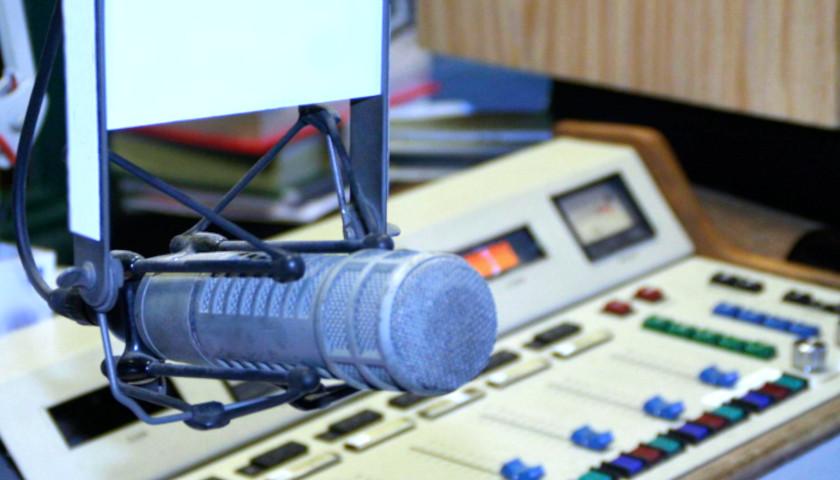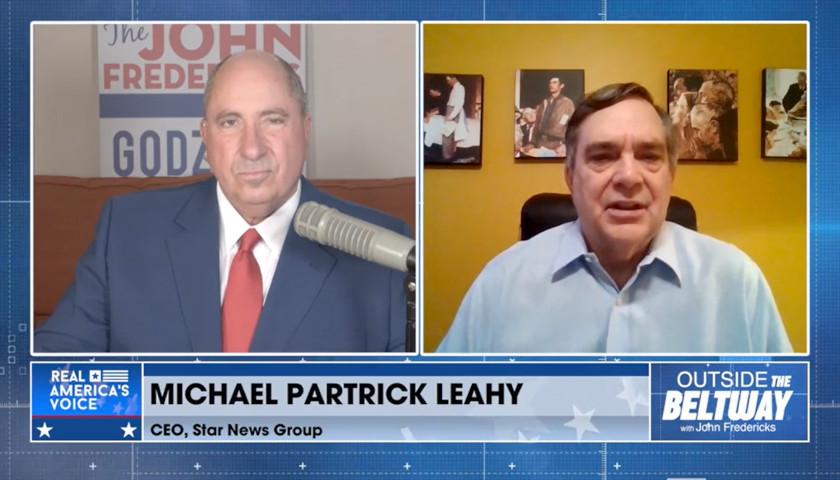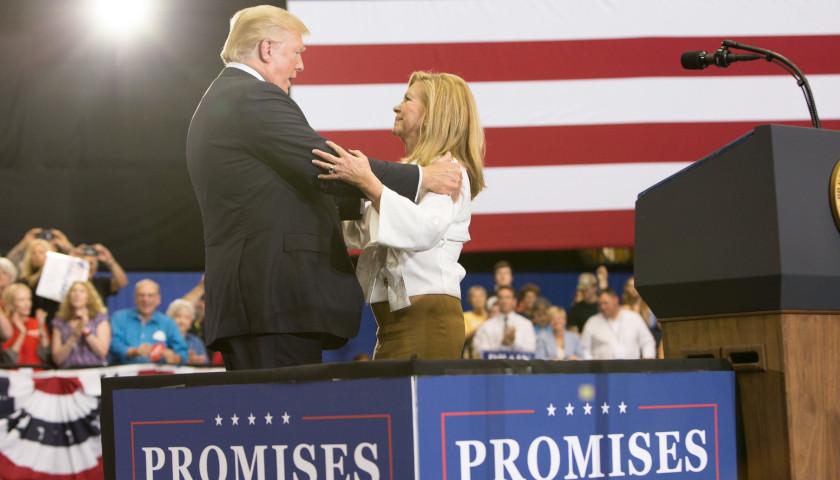Tuesday morning on The Tennessee Star Report with Michael Patrick Leahy – broadcast on Nashville’s Talk Radio 98.3 and 1510 WLAC weekdays from 5:00 a.m. to 8:00 a.m. – Leahy was joined live at the WHO studios in Des Moines, Iowa by long time friends Jim Larew and Nancy Zweng.
During the 6:00 a.m. hour, Zweng and Larew described the nature of the Iowa caucus and the differences in voting across the country as more of a private affair than public like the caucuses. Larew specifically noted towards the end of the segment that he felt the tradition of an Iowa caucus may have reached its limits.
Leahy: I am joined in the studio by two very good friends. Long time friends. I haven’t seen one of them for 41 years. Nancy Zweng from California, welcome to The Tennessee Star Report.
Zweng: Good morning Nashville.
Leahy: Nancy, so you live in Carmel, California is that right?
Zweng: That’s right.
Leahy: Now just to set the background. Nancy and Jim attended the Harvard class of 1976. Jim took some time off to campaign for the late Senator Culver. And graduated with me in 1977. And Nancy you graduated a year before me, but we all lived in the same residential dormitory. We were all in Eliot House, weren’t we?
Zweng: That’s right.
Leahy: And you went on to get a master’s degree at the Kennedy School.
Zweng: Correct.
Leahy: From there, you were top-level assistant James Schlesinger in Washington, D.C. for a couple of years.
Zweng: At the beginning of the Department of Energy.
Leahy: The very beginning. You helped found it Nancy, didn’t you? And then what happened after that, I got out of Stanford Business School in 1981 and you went to Stanford.
Zweng: And started in 1981 and graduated in 1983.
Leahy: And you were in the same class as Tom Steyer.
Zweng: Tom Steyer. He was at my wedding.
Leahy: Tom Steyer was at your wedding?
Zweng: Yeah.
Leahy: Had he made his billions at that time?
Zweng: He was well on his way.
Leahy: I note that, however, Nancy you did not come here to support Tom Steyer for President.
Zweng: No, I came from California to spend three days canvassing and caucusing for Joe Biden.
Leahy: So you’re here supporting Joe Biden. Spending your time and money. You came to Iowa City where Jim Larew lives.
Zweng: Correct.
Leahy: You spent three days. How do you feel after the results last night? (Laughs)
Zweng: Or lack thereof?
Leahy: What’s your reaction to this whole process?
Zweng: It was fascinating as a Californian who’s used to doing her mail-in ballot in the privacy of your own home and you take it over to the post office. And then to watch actually democracy in action, that part was fantastic.
Leahy: And you had that same experience at Jim’s precinct last night.
Zweng: Correct.
Leahy: I was at a precinct at Waukee, Iowa. Very interesting to watch that process. And then what happened Nancy?
Zweng: And we even had some confusion at ours. And then the total number of cards that were turned in?
Leahy: We had the same problem at Waukee.
Zweng: And then they were trying to reconcile that and people were standing around. People wanted to leave. Elderly people particularly. It was frustrating. And we almost in effect didn’t have a realignment process.
Leahy: Really?
Zweng: People were signing on the back of their card because they didn’t want to bother to realign because they wanted to leave because they were there for a long time.
Leahy: Jim Larew, let me bring you into this. You are the expert. You have been for almost a year now our ambassador to the Democratic field in Iowa. And as the ambassador, are you going to do damage control with the Democratic field, Jim?
Larew: Well after things, I’m thinking that we should invite Jimmy Carter to do an elections review. (Leahy laughs) It’s like an impoverished country in the third world.
Leahy: Nicaragua did better than Iowa. And I’m sorry to say that.
Larew: Bless his soul, Jimmy Carter he’s the one that started this all out. He discovered a tactical advantage to coming to Iowa and getting a springboard. I stayed late from our mid-year break at Harvard.
Leahy: Way back when.
Larew: That was my first caucus experience. Back then in those days, caucuses were held in my neighborhood school. Lincoln School. A small gymnasium with a small stage which was big enough for all of us. In fact, in those years they would bring political scientists around from the country.
Leahy: You were specimens to be observed in the political process.
Larew: We were bacteria in a petri dish. And we talked about issues with neighbors and friends. That part of it was just as important as the vote.
Leahy: Yes.
Larew: We were in a huge gymnasium.
Leahy: At the University of Iowa.
Larew: At the University of Iowa, which is still next to our precinct.
Leahy: 800 people. So I was Waukee, and they had a big main hall of a church, St. Boniface Catholic Church. They divided it into two. There were 260 people I think on one side. The numbers were changing by the way throughout the evening right? Nancy is saying yes they did change.
Zweng: Yes.
Leahy: And it was a little bit chaotic. Did you learn the first alignment results there Jim?
Larew: We did. Biden was not viable in our caucus and neither was Yang.
Zweng: Nor Steyer.
Larew: That’s right, Steyer had three people.
Leahy: He had three people?
Larew: Three people. So all three groups of those were not viable. So some people just left and under the rules said you could sign your card and still be counted.
(Commercial break)
Leahy: Now, Nancy, most sane people, when they have a 40-year reunion, they go to the Caribbean right? They go on a cruise to the Caribbean. But here you and Jim and I are. It’s like 30 degrees out there. We’re on Grand Avenue in Des Moines, Iowa and it’s freezing. Why did we do this?
Zweng: You know, we wanted to participate in our democracy.
Leahy: We were talking about that Nancy. And it’s very admirable on your part to take your own time and money to fly from Carmel, California. Tell us how this came about? Were you and Jim talking over a number of years? Tell us how you came to Iowa City to be involved and support the Joe Biden campaign.
Zweng: Well I think like most Americans I’ve been fascinated by the Iowa caucus process. It’s so different from what I’ve experienced as a voter back in California.
Leahy: Because you just show up and do a ballot by mail?
Zweng: I do a ballot by mail because I’m paranoid enough and I wait till the day of and put it in the basket in my local area for voting. But nonetheless, it’s just a no muss no fuss kind of a process. My mother lives close to me who’s almost 93 now, and we’ll go over the ballot together and talk about the issues and initiatives and mark our ballots. It’s a very private sort of thing.
Leahy: Very private.
Zweng: So the idea of going to a caucus where, there you are in front of your friends, neighbors and other family members and you have to declare publicly because you have to go stand in the corner of one candidate or another.
Leahy: Make a declaration! I’m for this guy, I’m for that guy.
Zweng: Jim has a very funny story about a couple where people hid from each other what their votes were.
Leahy: Let’s hear your story, Jim. Jim Larew, master storyteller. Always been a great storyteller. Tell us this story about the couple who hid who they were voting for.
Larew: Are you talking about on the floor?
Zweng: The couple where it wasn’t until the husband died that the wife admitted that all along she had voted Democratic. (Leahy laughs) Now she couldn’t have done that in Iowa.
Larew: That’s right. There are quaint things about the process if it could be preserved. I think a part of our heritage in Iowa and other New England Midwestern states where politics was more of a communal experience.
Leahy: As opposed to a private solitary experience as it is in most states these days.
Larew: That’s right. So much of Iowa is captured by Meredith Wilson’s words to a song, in Iowa, we stand toe to toe but we never see eye to eye. And what that means is that it really is an organic kind of process that makes Iowa, still a part of our DNA.
Trying to translate that into the phenomenal success of the caucuses which means lots more people come. Sometimes we just have to admit that we’re not doing it very well. We’ve reached our limits. And I think that’s what happened last night.
Listen to the second hour:
– – –
Tune in weekdays from 5:00 – 8:00 am to the Tennessee Star Report with Michael Patrick Leahy on Talk Radio 98.3 FM WLAC 1510. Listen online at iHeart Radio.
Photo “Joe Biden” by Johnny Verhovek.





